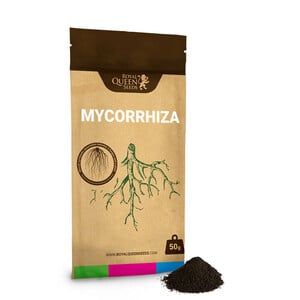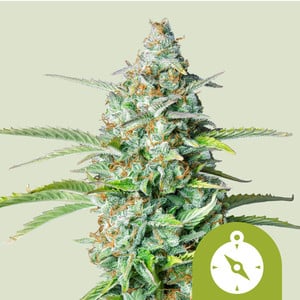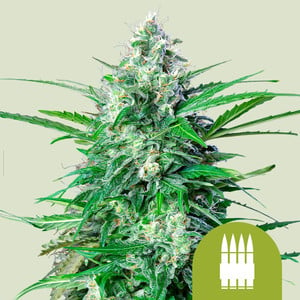 Weed Grow Guide by Royal Queen Seeds
Weed Grow Guide by Royal Queen Seeds
- Growing weed step by step
- Cannabis growing basics
- Choosing your seeds
- How to germinate seeds
- The cannabis vegetative stage
- The cannabis flowering stage
- Harvesting cannabis
- Trimming, drying, and curing
- Choosing pots and soil
-
Growing indoors
- A Complete Overview Of Growing Cannabis Indoors
- Cannabis Cultivation Tips: How To Set Up Indoor Grow Lights
- How Many Cannabis Plants Can You Grow Per Square Metre?
- Indoor Cannabis Growing: Relative Humidity and Temperatures
- Hydroponics Cannabis Growing Guide (with diagrams)
- Cannabis Micro Growing: Growing Great Weed in Tiny Spaces
- Growing outdoors
- How to grow autoflowering cannabis
- Cannabis nutrients and pH
- Cannabis troubleshooting: Nutrients
-
Cannabis troubleshooting: Growing
- Cannabis Seed Germination — Troubleshooting Guide
- How to Deal With Pythium (Root Rot) in Cannabis Plants
- Slow Cannabis Plant Growth And What You Can Do About It
- How to Prevent and Fix Stretching in Cannabis Seedlings
- Watering Your Cannabis: How to Fix Overwatering and Underwatering
- Understanding Male, Female, And Hermaphrodite Cannabis
- Identifying and Treating Common Cannabis Ailments
- How To Revive a Sick Cannabis Plant
- How to Avoid Mouldy Weed During Drying and Curing
- How to Prevent and Treat Dry and Crispy Cannabis Leaves
- What Cannabis Leaves Can Tell You
- Causes and Solutions for Yellow Cannabis Leaves
-
Cannabis Strains Grow Report
- HulkBerry Automatic Grow Report
- Blue Cheese Auto Grow Report
- Purple Punch Automatic Grow Report
- Triple G Automatic Grow Report
- Do-Si-Dos Automatic Grow Report
- Green Gelato Automatic Grow Report
- Haze Berry Automatic Grow Report
- Purple Queen Automatic Grow Report
- Cookies Gelato Automatic Grow Report
- Sherbet Queen Automatic Grow Report
- Sweet Skunk Automatic Grow Report
- Medusa F1 Grow Report
- Cannabis plant training
-
Weed growing tips
- The Cannabis Plant Anatomy
- How to preserve seeds
- How Much Sunlight Do Outdoor Cannabis Plants Need To Grow?
- How to Control and Prevent Stretching in Cannabis Plants
- My Cannabis Plants Are Growing Too Tall: What Should I Do?
- Should You Worry About Purple Or Red Cannabis Stems?
- What To Do When Your Indoor Cannabis Won’t Flower
- How To Protect Your Cannabis Plants From Heat Stress
- How To Tell If Your Female Cannabis Plant Has Been Pollinated
- Growing Medical Marijuana
- Bud Washing: How to Clean Your Weed
- Understanding Cannabis Yield per Plant
How To Get The Biggest Yields With Autoflower Cannabis

Contents:
Autoflowers have finally earned the respect they deserve. More importantly, they have earned a place in your grow room. With our guide to achieving maximum yields, you will crop the biggest harvest possible from your autoflowers!
Taking Autoflowering Cannabis Yields to the Limit
Autoflowers grow blazingly fast and don’t rely on light hours to enter bloom. As they make growing weed a lot more convenient, autoflowering strains have become very popular as more high-quality strains appear on the market.
There are several things growers can do to encourage bigger yields from their autoflowers.
1. Start autoflowers in their final containers
Autoflower cannabis will race from seedling to stash in a quick 60–90 days. When autos are stressed too much or their growth is otherwise slowed, they will still bloom at the same time, and your yields will suffer.
To max out yield, you should sow seeds directly into their final containers. Alternatively, you can germinate them using the paper towel method (or whatever your preferred germination method may be) and then put them straight into large pots. A healthy root zone must be fostered early.
2. Use bigger pots
The bigger the pot, the more the roots will develop and the bigger your plant will be. If you constrain it in a pot that’s too small, your plant's development and production will be reduced. It is recommended that you use 15–20-litre pots to maximise results without overwhelming your plants. A pot that is too big will be a waste of substrate and fertiliser.
3. Consider pot material
A healthy and strong root system means healthy plants with great yields. Consider “smart pots”, like the RQS fabric pot, to give you an advantage in this domain. With their ability to prevent plants from becoming root bound, fabric pots are better for overall development.
In addition, fabric pots make it nearly impossible to overwater your cannabis as they facilitate excellent drainage.
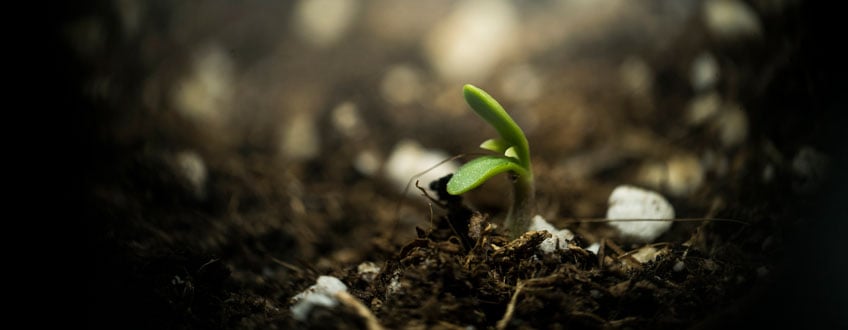
4. Use an airy growing medium
Autoflowers grow fast and vigorously, and have only a limited time to do so. Because of that, you want to support their growth in every way possible. A loose and airy growing medium makes it easier for your autoflowers to develop a strong root system.
If the substrate is too compact, you can make it suitable for autoflowers by adding some perlite and coco coir. See our article here for more tips on the best soil for your autoflowers.
5. Add a root stimulant
Another way to support root development is by adding a root stimulant. One good way to do this is by introducing beneficial fungi into your growing medium. Mycorrhizal fungi increase nutrient and water uptake, protect plants from disease, and generally encourage an optimal growing environment.
6. Start seedlings indoors
Whether you are planning an indoor or an outdoor grow, make sure to start your seedlings indoors.
As you and your plants are on the clock from day one, you want to ensure your seedlings root well. A cool white CFL, appropriate LED, or even a sunny windowsill are adequate. Just make sure vegetative growth goes smoothly; ready or not, your autoflowers will bloom on schedule.
Starting seedlings indoors? Our guide has everything you need to know to make the most of this critical phase. Download now!
Free RQS
Grow Guide!

7. Support plant structure
Staking or plant support of some kind may be needed to keep your plants upright and their buds healthy.
There are several ways you can go about this. Bamboo stakes and strings, trellis netting, or tomato plant cages can all be used to help a plant carry its heavy load. If you want more tips, see this article on five ways to support heavy buds.
8. Opt for 18 hours of light
Opinions differ on whether keeping plants under a constant 24-hour light cycle is beneficial. 18/6 is still the most common, and will save you money on energy.
Indeed, you could potentially grow them with less light, but we are aiming for a huge harvest, so you’ll want to provide them with as many lumens as possible. More light, more buds. Easy.
When grown outdoors, your autoflowers will thrive in the fine summer weather. Sunlight for 18 hours is not essential because Mother Nature’s grow lamp is infinitely more powerful than any artificial bulb.
9. Use reverse osmosis water
Your water may be fluoridated or chlorinated, or may contain other impurities that hinder healthy microbial growth in the soil. In short, if your domestic water is unsuitable for drinking, it won’t do good for your cannabis plants either. You can solve this by using reverse osmosis water.
Simply spoken, reverse osmosis is a filtration process that results in pure, ultra-filtered water. With this, you are in total control of the mineral profile of your water. This can benefit the growth of your plants and your yield.
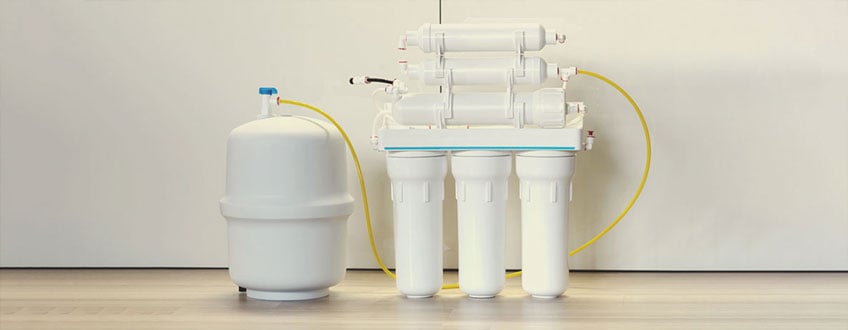
10. Dial in nutrients and pH
Autoflowers are usually smaller, so they drink and eat less compared to large photoperiod plants. If you’re using ordinary cannabis nutrients, a good idea is to start out with 50% or even 25% of the recommended dose.
Soil growers are advised to use lightly fertilised soil for autoflowering cannabis. Heavily fertilised soils will burn these babies. Aside from supplements like enzymes, vitamin B, and beneficial fungi, autoflowers don’t really require large doses of base nutrients during their short vegetative stage. Heck, with good-quality soil, your plants may do just fine without additional nutes all the way to harvest.
If you must add nutrients to the soil early on, do so sparingly. Generally, bloom nutrients and boosters are all that’s needed during their life cycle. Even in flowering, low to medium doses of nutrients will suffice. Over-fertilising plants is a common yield-thwarting mistake autoflower growers often make.
If the pH is off, your plants can’t uptake nutrients even if they are present. The correct pH for your water when growing in soil is 6.0–7.0. With a few drops of pH up or down products, you can adjust your water to the correct pH window.
11. Prioritise climate control
Seedlings and young plants prefer a more humid environment, while flowering plants require significantly less humidity to avoid mould and rot.
At times, just a simple standing fan or leaving a window open is all that’s needed to create an optimal growing environment. If that doesn’t cut it, look into solutions such as a heater or air conditioner for your grow room.
12. Use CO₂
It is scientifically proven that plants use CO₂ as fuel for photosynthesis, and with more CO₂ in your grow space, there should be a noticeable difference in growth rate and size.
The thing is, it only makes sense to provide your plants with CO₂ if all the other conditions in your grow room are already optimal. If there are issues with temperature, humidity, water, or nutrients, address these first before looking into a more elaborate (and expensive) CO₂ system.

13. Train your plants
Low-stress training (LST) is a non-destructive training technique that even beginners can use. As the name implies, it is a minimally invasive technique that doesn’t involve any major damage to plants.
All you do is carefully bend and tie down the stem and branches to encourage lateral growth. This way, more bud sites are exposed to your grow light, resulting in fatter nugs and bigger harvests.
If you’re an expert grower and not afraid to put a knife to your plants, you can see whether topping will work for you. Just ensure that everything else is under control before looking into these more-involved plant training techniques.
14. Use Sea of Green (SoG)
The sea of green, or SOG, method involves growing many small plants in close proximity to max out space and yields. This is especially effective in otherwise small grow-ops, and there is no better candidate than autoflowering strains. Their fast growth and short stature essentially do everything for you. Plus, no pruning or excessive handling is needed.
15. Use progressive harvesting
It normally happens that the flowers at the top of the canopy mature faster than those at the bottom. Simply clip off the individual buds that are ready, and wait for the rest to ripen. Wait 1–2 weeks between each harvest and watch for signs that they're ready to pick. Most autoflowering plants only require two cycles of progressive harvesting, but larger plants may need more.
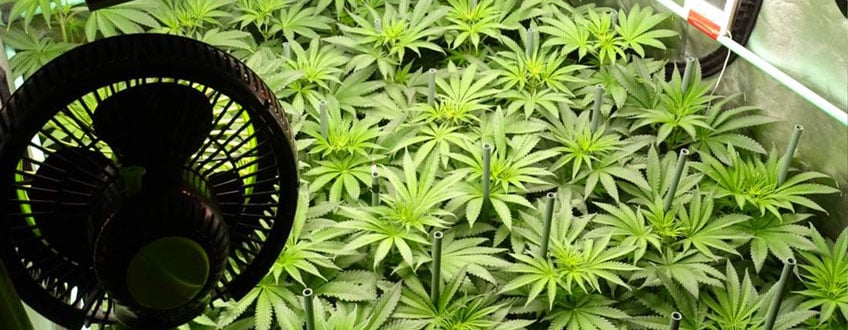
16. Document, refine, and repeat
Nobody is born a master cannabis grower. To become an expert, you want to pay attention and carefully record each process used in your grow. Only this way will you notice which techniques render the best yields.
Something can always go wrong when growing cannabis. The key to high yields is swiftly and smartly identifying problems as they occur. As you refine your processes, the health and yields of your plants will improve over time.
The Top 5 Highest Yielding RQS Autoflower Strains 2022
Perhaps more important than any other factor listed above, genetics have a huge influence on a given strain’s production potential. So, before we conclude our guide on achieving maximum yields with autoflowers, here is a list of the highest-yielding autoflowers from Royal Queen Seeds.
1. Northern Light Automatic
Northern Light is a legendary cannabis strain that derives from Afghan indica genetics. First bred in the 1970s US, and coming to Europe in the 80s, this indica is still a favourite among many cannabis lovers. The autoflowering variant Northern Light Automatic shines with all the goodies of the “big one”, without compromising on flavour and effect. Moreover, she is one of the highest-yielding autoflowers out there with a whopping 550g/m² indoors. She pleases with a sweet, earthy pine flavour and a cerebral effect that is happy and uplifting.
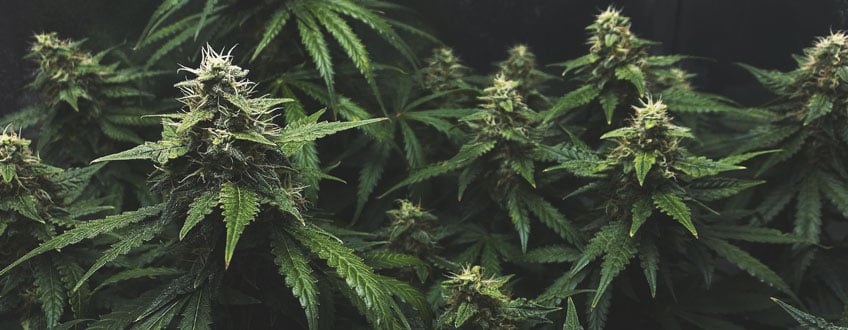
Northern Light Auto
|
|
Northern Light x Ruderalis |
|
|
500 - 550 gr/m2 |
|
|
80 - 120 cm |
|
|
6 - 8 weeks |
|
|
THC: 14% |
|
|
Sativa 0% Indica 80% Ruderalis 20% |
|
|
170 - 220 gr/plant |
|
|
130 - 160 cm |
|
|
10 - 12 weeks after sprouting |
|
|
Clear, Uplifting |
2. White Widow Automatic
White Widow Automatic is another fabulous autoflowering variant of a cannabis classic: White Widow. The strain owes its name to its appearance as its massive trichome production covers the whole plant in a thick white coat of resin. The autoflowering version by RQS has a woody, earthy aroma and taste similar to, but not as strong as, the feminised photoperiod version. She also has a slightly more stoney effect. Expect an astonishing 450g/m² from this compact lady!
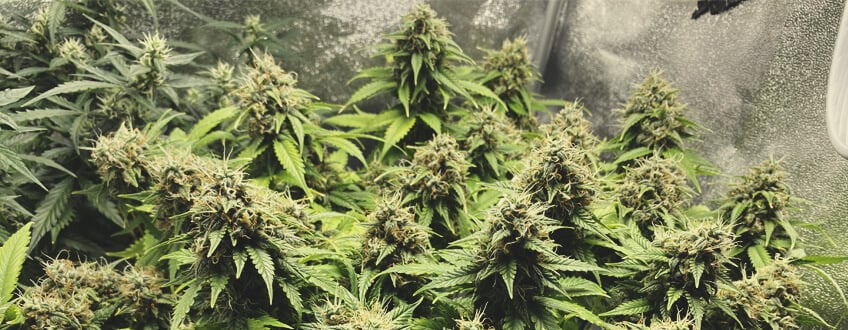
White Widow Auto
|
|
White Widow x ruderalis |
|
|
400 - 450 gr/m2 |
|
|
40 - 80 cm |
|
|
7 - 8 weeks |
|
|
THC: 14% |
|
|
Sativa 40% Indica 40% Ruderalis 20% |
|
|
190 - 240 gr/plant |
|
|
50 - 110 cm |
|
|
10 - 12 weeks after sprouting |
|
|
Physically Relaxing, Stoned |
3. Royal Cheese Automatic
Royal Cheese Automatic is the autoflowering version of the legendary UK Cheese. She has the same iconic aroma as the original, but now with all the perks of a fast-paced autoflower. Get ready to harvest top-notch bud just 10 weeks after planting your seeds. Royal Cheese Automatic makes smokers happy with a strong taste of sour cheese, earth, and spices, and a strong physical effect with a happy and euphoric note. Yields of up to 475g/m² are impressive for a plant that barely reaches 1m tall.
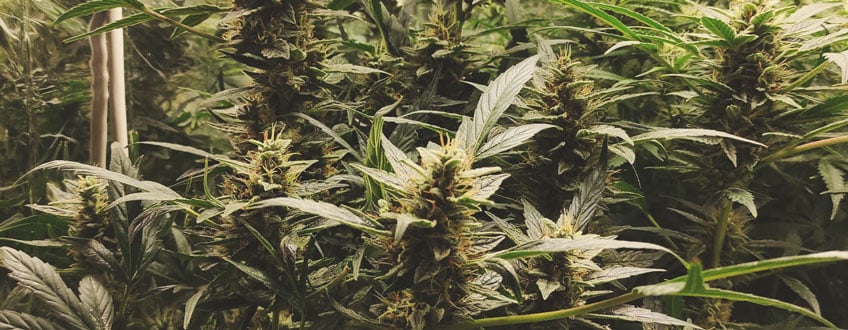
Royal Cheese Auto
|
|
Cheese x Royal Critical x Ruderalis |
|
|
425 - 475 gr/m2 |
|
|
60 - 100 cm |
|
|
7 - 8 weeks |
|
|
THC: 15% |
|
|
Sativa 30% Indica 50% Ruderalis 20% |
|
|
160 - 210 gr/plant |
|
|
60 - 120 cm |
|
|
11 - 12 weeks after sprouting |
|
|
Physically Relaxing, Stoned |
4. Hulkberry Automatic
HulkBerry Automatic by RQS is one of the strongest autoflowering strains you can get your hands on. This sativa-dominant hybrid, a cross between HulkBerry and Diesel Auto, scores with THC levels of up to 21%. This way, even experienced smokers can get their blaze on and enjoy a fantastic high. With an effect that combines euphoric, creative, and uplifting aspects, she makes a fabulous smoke alongside all kinds of daytime activities. She blends spicy, earthy, and fruity strawberry aromas into her smoke, and growers can achieve 400–500g/m² of her massively potent buds when all is said and done.
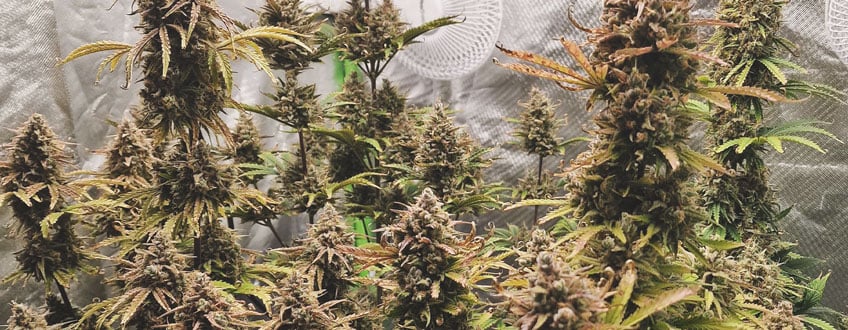
HulkBerry Auto
|
|
Hulkberry x Diesel Auto |
|
|
450 - 500 gr/m2 |
|
|
80 - 120 cm |
|
|
6 - 7 weeks |
|
|
THC: 21% |
|
|
Sativa 65% Indica 30% Ruderalis 5% |
|
|
100 - 150 gr/plant |
|
|
80 - 120 cm |
|
|
8 - 9 weeks after sprouting |
|
|
Clear, Uplifting |
5. Royal AK Automatic
Royal AK Automatic is one eclectic autoflower. This variant of the famous AK-47 blends the genetics of Colombian, Mexican, Thai and Afghan into a strain that stands out with a heavy-hitting effect and good yields. The slightly indica-dominant hybrid (40% indica, 35% sativa, 25% ruderalis) has a happy and active effect that makes it suitable for the daytime. Her smoke blends hashy, spicy, and sweet notes reminiscent of incense. Although the plant won’t get taller than 80–100cm, it can yield as much as 475g/m².
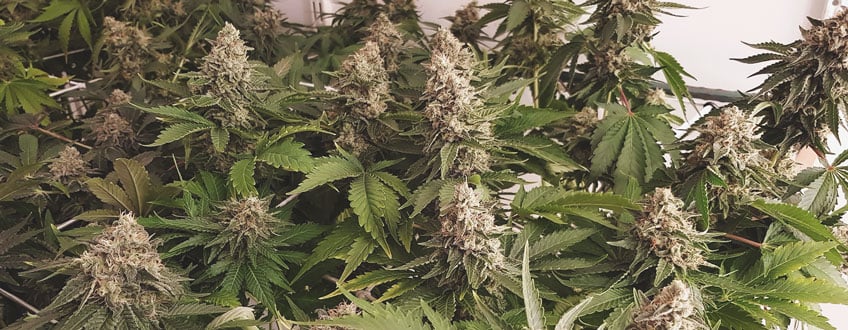
Royal AK Auto
|
|
AK 47 x Ruderalis |
|
|
275 - 350 gr/m2 |
|
|
60 - 70 cm |
|
|
6 - 8 weeks |
|
|
THC: 15% |
|
|
Sativa 35% Indica 40% Ruderalis 25% |
|
|
110 - 160 gr/plant |
|
|
70 - 100 cm |
|
|
11 - 12 weeks after sprouting |
|
|
Laughter, Motivating |
Growing Autoflower
 Grow Guide Topic Finder
Grow Guide Topic Finder
- Growing weed step by step
- Cannabis growing basics
- Choosing your seeds
- How to germinate seeds
- The cannabis vegetative stage
- The cannabis flowering stage
- Harvesting cannabis
- Trimming, drying, and curing
- Choosing pots and soil
-
Growing indoors
- A Complete Overview Of Growing Cannabis Indoors
- Cannabis Cultivation Tips: How To Set Up Indoor Grow Lights
- How Many Cannabis Plants Can You Grow Per Square Metre?
- Indoor Cannabis Growing: Relative Humidity and Temperatures
- Hydroponics Cannabis Growing Guide (with diagrams)
- Cannabis Micro Growing: Growing Great Weed in Tiny Spaces
- Growing outdoors
- How to grow autoflowering cannabis
- Cannabis nutrients and pH
- Cannabis troubleshooting: Nutrients
-
Cannabis troubleshooting: Growing
- Cannabis Seed Germination — Troubleshooting Guide
- How to Deal With Pythium (Root Rot) in Cannabis Plants
- Slow Cannabis Plant Growth And What You Can Do About It
- How to Prevent and Fix Stretching in Cannabis Seedlings
- Watering Your Cannabis: How to Fix Overwatering and Underwatering
- Understanding Male, Female, And Hermaphrodite Cannabis
- Identifying and Treating Common Cannabis Ailments
- How To Revive a Sick Cannabis Plant
- How to Avoid Mouldy Weed During Drying and Curing
- How to Prevent and Treat Dry and Crispy Cannabis Leaves
- What Cannabis Leaves Can Tell You
- Causes and Solutions for Yellow Cannabis Leaves
-
Cannabis Strains Grow Report
- HulkBerry Automatic Grow Report
- Blue Cheese Auto Grow Report
- Purple Punch Automatic Grow Report
- Triple G Automatic Grow Report
- Do-Si-Dos Automatic Grow Report
- Green Gelato Automatic Grow Report
- Haze Berry Automatic Grow Report
- Purple Queen Automatic Grow Report
- Cookies Gelato Automatic Grow Report
- Sherbet Queen Automatic Grow Report
- Sweet Skunk Automatic Grow Report
- Medusa F1 Grow Report
- Cannabis plant training
-
Weed growing tips
- The Cannabis Plant Anatomy
- How to preserve seeds
- How Much Sunlight Do Outdoor Cannabis Plants Need To Grow?
- How to Control and Prevent Stretching in Cannabis Plants
- My Cannabis Plants Are Growing Too Tall: What Should I Do?
- Should You Worry About Purple Or Red Cannabis Stems?
- What To Do When Your Indoor Cannabis Won’t Flower
- How To Protect Your Cannabis Plants From Heat Stress
- How To Tell If Your Female Cannabis Plant Has Been Pollinated
- Growing Medical Marijuana
- Bud Washing: How to Clean Your Weed
- Understanding Cannabis Yield per Plant
Categories
Growing Autoflower
Nutrients and boosters


























